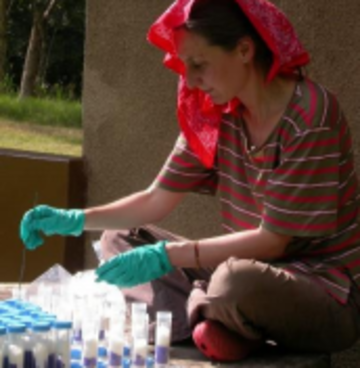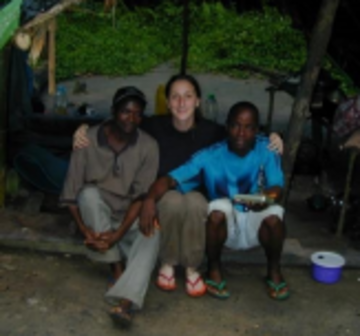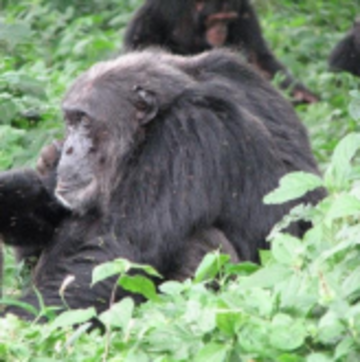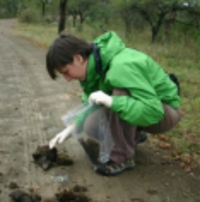Caroline's pathway
Caroline's pathway to Departmental Lecturer

Pathways less travelled, doubts and brick walls...
I attended my local university as an undergraduate – Bournemouth University where I studied BSc (Hons) Environmental Protection. In my final year, it was remediation of contaminated land or water and sewage treatment that I planned to pursue and find a career in, but in finishing my degree, and having no clear idea how to follow that direction, I took a job at a local health food shop. It was then that I realised a seed had already been planted. During my second year of my undergraduate, Ian Redmond had given a talk on the challenges surrounding orangutan rehabilitation and reintroduction, and the dire threats many orangutans face from human activity. In my year at the health food shop, I read more and more on orangutan behaviour (lots of paying out for scanned copies of papers through my local library) and rehabilitation and reintroductions of primates and then saved up from working at the shop to apply to take part in an Operation Wallacea Project at Tabin Wildlife Reserve, Malaysia, Borneo to conduct diurnal and nocturnal reconnaissance surveys of wildlife. At Tabin, I realised I enjoyed being in the field, and have great memories of the local people and team members that I worked with; but seeing brief glimpses of langurs of different species associating together, proboscis monkeys feeding along a riverbank, and on my second-last day, an orangutan sitting in an oil palm plantation that skirted the reserve, long calling to another orangutan divided by the road I was standing on, I knew I wanted to learn more about primates.

I had no money or job and, on my return, I started working as an Animal Health Officer for Devon County Council. I worked full-time and paid my way through the part-time study of the MSc Primate Conservation at Oxford Brookes. I learnt a lot, but completed it distance-learning and with a full-time job, felt quite detached from an academic setting. I enjoyed the course very much, but didn’t do well on the thesis front; I add this as I want those who may feel/felt that their experience or outcome of their degree did not go/has not gone the way they planned – and like me, feel/felt knocked down and lacking in confidence in their abilities to continue along an academic pathway to realise that this does not have to mean the end of the road. I carried on working as an Animal Health Officer (for seven years in total) thinking perhaps it was (my brick wall), but then decided on a whim to go to a Primate Society for Great Britain conference in Liverpool as I had been a member for a year and still held a torch for primates. It was there that I sat in the seat of William McGrew by mistake. He politely informed me of this and then listened very patiently of my frustration of having hit a brick wall and my interest in the application of and issues relating to primate reintroductions. He later informed me that he would be starting a lecturer position for 6 years at the University of Cambridge, and that he would supervise me for a PhD! Stunned and hopeful, we emailed for two years about possible projects and how to fund the PhD itself. His deal was that he only took on students who had already worked in Africa and so I saved up and quit my Animal Health job to go to Nigeria for 6 months to work at CERCOPAN and help train two wonderful Nigerians to radio-track Mona guenons who were going to be released into the Iko-Esai Community Forest in Cross River State. I lost one of the copper wires of the aerial on my first day in the forest and had to pigeon-step all the way back to where I had been that day; I found the wire, and seeing a leaf pile rise as I went to pick up the wire and go down as I stepped away did not help my snake phobia at all, but again, in that 6 months, my love of being in the field was cemented. I worked with amazing people and I got to observe both wild and captive primates. The reintroduction did not happen, but I intended to return to Nigeria for a PhD.

On my return, my wonderfully, supportive partner (now husband) and I sold our house, and we used the money from the sale to help us both get started with our PhDs. I started a PhD at Cambridge with amazing workers who had all already studied apes and published – this was very intimidating to say the least – but again, I add this here to convey that we all start in different places to others, some who seem to be ahead of you, but each of our journeys are different and we all get there in the end – I shared blood, sweat and tears with these very special people who remain lifelong friends. In my first year, I went back to Cross River State in Nigeria to conduct reconnaissance surveys and assess potential study-sites, and also to Nimba Mountains and Bossou Forest in Guinea and so gained experience in studying both habituated and unhabituated apes. By the end of my first year, my PhD question was looking very different to what I had proposed on my application to Cambridge; I chose the question that most excited me - validating ape dietary interpretations (make sure the research question excites you as you will be working on it for a long time). This research question required me to study a habituated population and I was very lucky to be able to do so at Kanyawara in Kibale National Park, Ugalla. Again, a truly wonderful experience, and in my sixth week I heard the chimpanzees at Kanyawara vocalising and ran to find them and literally ended up making a sudden, clear leap over a male chimpanzee, Tofu, who was lying on the path as I rounded the corner. Tofu and the other chimpanzees did not move away on my arrival and as I backed away to 10m or so to observe them, I felt utterly humbled; to this day, it remains one of the most rewarding moments in this journey to know that these apes tolerated me at close proximity.

I obtained a lot of my funding for sample analyses (genetics, stable isotope, phytolith) of plant and ape faecal samples collected at Kanyawara late in the game (most in my fourth and final year of the PhD). I got through my PhD with hardship funds (fortunately, I was awarded a hardship scholarship in my second year from the University to complete my degree, as well as from my college, Murray Edwards). This is to share that there is a way, even without prestigious funding awards. I was also very lucky to have supportive peers and a great, super-patient and generous PhD mentor.
I then saw a poster at my college to apply for a Leverhulme Study Abroad Studentship – it was at this time that I developed a postdoc project to study the efficacy of phytolith and stable isotope analyses to reconstruct diet and environments of hominins using chimpanzees and their home ranges as modern analogues which entailed sample collection from west and east African sites, and an opportunity to work at Kobi Fora, Kenya. I was awarded funding from the Leverhulme Trust and Marion Bamford took me on as a postdoc at the Evolutionary Studies Institute, University of the Witwatersrand in Johannesburg, South Africa. A provisional one year position became a five-year position in the form of two postdocs, and my two children were born there as my husband joined me. South Africa is a beautiful country full of culture and heritage and I learnt so much under the wing of Marion, I collected samples from Nimba and Bossou again in Guinea, baboon sites in south-west South Africa, and visited many hominin sites in the Cradle of Humankind. Since then, my research interests have also taken a journey to now focus on modelling foraging strategies of early hominins from studying plant and insect intake in extant primates across multiple sites. I am a strong advocate of science with integrity, not just publishing for the sake of it, conducting fieldwork to gain answers and investing in conservation education that works to change perceptions and working with the many people involved in the threats we see causing the disappearance of our amazing relatives – primatology in the Anthropocene must consider the needs of local communities to ensure the survivorship of many remaining primates.
In 2017, I applied for a Departmental Lecturer position in the School of Anthropology and Museum Ethnography at the University of Oxford, and have been here since. I love teaching as it allows me to share my passion for primates and human evolution with students and support them as they travel along their own pathway. I am also currently a tutor to human science students and a stipendiary lecturer to biology students at St Hugh’s College. I am one of many 21st C academics that has multiple fixed-term positions. I wish to see a progression in academia that accepts a new type of academic – one that travels on a more flexible path, and where there is a greater appreciation, support and awareness by employees that skill sets developed with this flexibility are invaluable, and can be applied across a broader context, across disciplines and beyond.
This has not been the most conventional academic journey, but what does that look like anyway? If you are passionate about what you do, in this case studying primates and unpuzzling our evolution, you can forge a path and achieve goals even on a road that may sometimes feel less travelled and who knows where it will take you next?! If you would like to chat about your own journey that may take you towards primatology, palaeoecology, anthropology, you are welcome to email me: caroline.phillips@anthro.ox.ac.uk.









